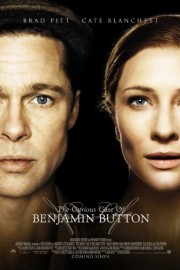The Curious Case of Benjamin Button
(Amendment to this review, from May 2023: When I rewatched the film in 2023 for my Patreon-exclusive “Leaving the Collection” series, I’ll admit that I find myself disagreeing with my initial thoughts on this film with regards to feeling its comparison with “Forrest Gump”- which I see more clearly now- and the performances feeling largely disconnected emotionally. That is where my grade is coming from here.)
His films are so divergent in story and style, I was thinking about how to open this review of David Fincher’s latest- and most surprising- film. How does this film, which tempers Fincher’s usual darkness with unexpected soul, fit in with a filmography largely about serial killers (“Se7en,” “Zodiac”), head fucks (“The Game,” “Fight Club”) and suspenseful horror (“Panic Room,” and even “Alien 3”)?
But as the story of Benjamin Button unfolds in the memory after the film ends, Fincher’s modus operandie becomes clear. With the exception of his director-for-hire “Alien” debut, Fincher’s films are about taking his characters to the psychological extremes, whether the pressure comes from society, crime, or personal obsession. Once you figure out this link in his films, it’s not hard to see how this film falls into place in his career.
But with “Button” and last year’s criminally-underappreciated “Zodiac,” however, Fincher has started to transcend his start as a music video director and become a serious filmmaker without losing his visual flair, letting the story absorb his visual imagination into being part of how he tells the story. I’m not sure how “Button” will play to geeks who savor the visual thrills he provided in his earlier films (including the cult classic “Fight Club”), but this one loved it, even more once I left the theatre, and remembered the film afterwards.
Part of that is the tone. Many critics have already compared “The Curious Case of Benjamin Button” to “Forrest Gump,” citing a similar structure and a shared screenwriter in Eric Roth. But that’s as unfair a comparison as it was a few years ago with Tim Burton’s equally-structured jewel “Big Fish.” All three films found equally-original ways to tell life-long stories where love, chance, and fantasy combine to find the fundamental joy and pain inherent in life. But more so than “Gump” and “Fish,” “Button” is driven by a knowledge of mortality that resonates deeper as the story goes along, as Benjamin Button (Brad Pitt) is forced to watch as his loved ones grow more frail as he gets younger over the years.
In reviews I’ve read, Pitt has been criticized in his performance as feeling detached and dull (especially in middle age when he looks like…Brad Pitt), but they’re missing the point. It’s true that as an elder-looking youngster, Pitt- who through digital painting and masking is brilliantly made up as an old man with the heart of a 7-year old- does his livliest acting work in the film, but he finds just the right notes later on. Benjamin is acutely aware of his mortality from an early age, so if he feels detached even when he looks younger while he’s in his 40s, it can be seen as a by-product of that sense of his own mortality. He was told early on that he wasn’t long for this world- now here he is an old soul, already living on borrowed time if you believe his doctors early on, but on the outside living in the body of a young man whose physical and mental capacities are starting to fail him, and would be a burden on those he loves (including his adopted mother- played by the heartfelt and soulful Taraji P. Henson- and the love of his life Daisy- played by the elegant and open-hearted Cate Blanchett) even when he looks like he’s at the prime of his life.
Alexandre Desplat’s score reflects this, taking its’ cue from Fincher’s visually-rich (and emotionally-reflective) direction and Pitt’s performance. Though I’ve never completely warmed up to Desplat’s work in the past (he’s previously scored “The Golden Compass,” “The Queen,” and “Syriana”), I was nevertheless curious to hear his approach in this film, if only because of the track record of bold scores in previous Fincher films (like David Shire’s for “Zodiac,” Howard Shore for “Se7en” and “Panic Room,” and Dust Brothers for “Fight Club”). Desplat doesn’t disappoint, crafting an emotionally-poignant musical work that hits every beat in the story with feeling and imagination, a resonate work comparable to- here it is again- Danny Elfman’s score for “Big Fish” and Alan Silvestri’s for “Forrest Gump.”
When considering the movie afterwards, it’s not really hard to see what drove Fincher to this adaptation of the short story by F. Scott Fitzgerald. In purely storytelling terms, it’s another display of what has seemed to become his thematic intrigue as a filmmaker, as well as a continuation of the maturation that hit a new level with “Zodiac.” What’s curious is what possessed the producers of this film to put their faith in Fincher for what is fundamentally a romantic (and sad) love story. Maybe it was his vision of the story (all 166 minutes of it). Maybe it was the fact that he could get Brad Pitt to play the lead (their third collaboration together), upping the ante in box-office potential. Whatever it was, it paid off for them and for us. “Benjamin Button” may be fundamentally a fantasy, but it gets to an emotional truth that cuts deep…like those other two films I’ve mentioned in this review a couple of times.










